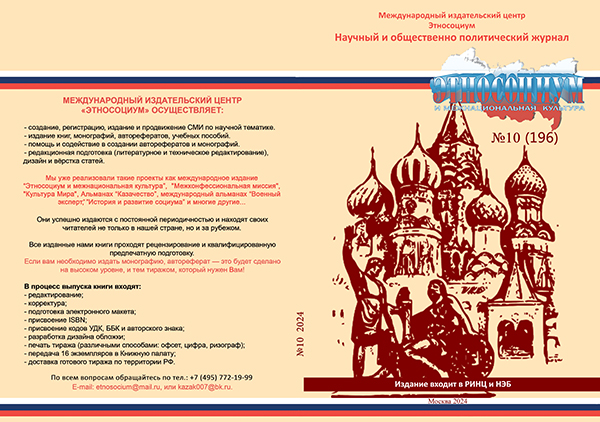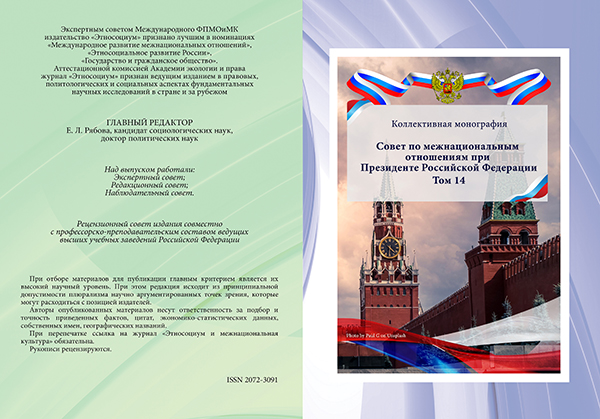

Content
|
COUNCIL ON INTERETHNIC RELATIONS UNDER THE PRESIDENT OF THE RUSSIAN FEDERATION
|
|
|
Khubieva Z.A., Magulaeva A.A., Karaeva A.M. Some aspects of the evolution of morality in modern conditions
|
9
|
|
REGIONAL RESEARCH
|
|
|
Logacheva E.A. Influence of Omega-3 polyunsaturated fatty acids on the development of cognitive functions of students
|
16
|
|
Starostina N.A. Mixed foreign language learning: principles, models and methods of effective implementation in the educational process at the University
|
26
|
|
Filippov S.V. Features of the formation of the assortment policy of trade enterprises
|
33
|
|
CURRENT PROBLEMS OF MODERN SOCIETY
|
|
|
Eshchenko T.V., Skabe Y.A. The use of innovative technologies in the study of the discipline "engineering geology and soil mechanics"
|
40
|
|
Khubieva Z.A., Magulaeva A.A. Features of innovation activity as an economic and legal institution
|
44
|
|
INTERNATIONAL RELATIONS
|
|
|
Petrosyan F.A. Russia's national interests in the Arctic: conceptual and historical aspect
|
51
|
|
Meng Weihan The civil service systems of China and Russia at the current stage
|
63
|
|
Bairamkulova T.D., Batchaeva M.K., Gedieva T.K. The Star Chamber as an organ of emergency justice in early absolutism in England
|
73
|
|
Abstracts
|
80
|
|
Authors
|
88
|
|
Requirements to materials submitted to the international publishing house "Etnosocium"
|
91
|
In the context of the reform of modern Russian society, the analysis of morality as an element of social regulation is a very urgent problem. In the work, the author reveals that morality is the most ancient form of social consciousness, and therefore it is difficult to distinguish moral relations from other forms of social consciousness in a «pure» form, because these relations are organically included in the fabric of all forms of spiritual relations. Therefore, morality began to act as an element of regulating the relationship of people in any sphere. But speaking about the relatively independent field of action of moral norms, we must talk about their main feature - the pervasive nature of morality in the most diverse areas of social relations. In particular, attention is focused on the fact that by making a moral choice of an act, a person forms a certain line of his behavior and the reciprocal tendency of other people's actions. The scientific novelty lies in the process of studying the stability and variability of moral experience in accordance with the requirements of the epoch of the development of new elements of moral norms.
Key words: individual, morality, self-esteem, self-regulation, behavior, needs, social relations.
This article examines the effects of omega-3 polyunsaturated fatty acids on students' cognitive development. Omega-3 fatty acids derived from fish and plant sources play a key role in maintaining brain health and improving cognitive performance. The study aims to analyze the relationship between omega-3 consumption and measures of memory, attention and learning ability in students. The work would analyze the research in detail, revealing the positive effects of these acids on cognitive function. The results of the study may be of practical importance for the development of recommendations to optimize the nutrition of students in order to improve their academic performance and overall productivity.
Key words: omega-3 polyunsaturated fatty acids (PUFA), cognitive health of students, memory, attention, educational process, student youth, educational environment, health-saving education, physical culture and sport, healthy lifestyle.
The article reveals the concept of blended learning. The principles, models and methods of this type of training are analyzed. A study of the effectiveness of the introduction of blended learning into the educational process is described. The author reveals the positive and negative sides of blended learning, provides examples of ways out of difficult situations associated with its implementation.
Key words: blended learning, teacher-student interaction, principles, models and methods of blended learning.
The problems of managing the assortment policy of a trading enterprise are considered, the definitions of the assortment policy, the product as its element, the product range and its classification features are clarified. The stages of building the assortment matrix of a trading enterprise and the key vectors of managing the assortment policy of a trading enterprise in the long term are presented.
Key words: assortment policy, product, consumer properties, product range, product classifier, product items, assortment matrix, planogram, assortment minimum.
This article analyzes the effectiveness of innovative methods in the study of disciplines. Interactive learning technologies act as an innovative approach. They are used to create laboratory and practical works with the help of computer technology and subsequent discussion of the results obtained. This allows making the learning process more interesting and intriguing for students.
Key words: innovative methods, interactive technologies, process, learning, laboratory work, practical work, discipline, study, development.
In the context of the reform of modern Russian society, the analysis of innovation activity and its legal regulation is a very urgent problem. Despite the apparent stability of the regulatory framework for innovation, this structure is subject to constant shocks. Scientific and technological progress generates more and more new challenges, to which participants in innovative activities have to look for worthy answers. In particular, attention is focused on the fact that nowadays innovations in various fields of science, technology, and production are in high demand, which requires appropriate legal regulation.
Key words: innovative activity, structural competitiveness, economic space, technologies, production, state, legal environment.
The article contains an analysis of the historical periods of Arctic development and Russia's interests at each stage in this region. The article also examines priority interest groups at each stage of the study. The work uses a specific historical approach, which made it possible to substantiate the periodization of Arctic development and research and determine priority areas for implementing Russian interests in the Arctic region at each stage.
Key words: Arctic, national interests, history, stages, concept.
This article is devoted to the analysis of the most characteristic features of the modern civil service system of China in comparison with the model of public service of the Russian Federation. Particular attention is paid to cultural, historical, and institutional aspects influencing the structure and dynamics of civil service in both countries. The objective of the study is to identify key differences and similarities between the two systems and assess their development prospects. The article analyzes data reflecting the results of civil service reforms, such as corruption levels, management efficiency indicators, and the implementation of information technologies. Comparative analysis methods are employed, including the examination of legal acts and leading experts' publications. The study reveals that despite significant differences in approaches, both countries aim to establish an effective and transparent civil service system.
Key words: civil service, China, Russia, meritocracy, anti-corruption measures, ethics, political control, decentralization, professionalism, management technologies.
The article analyzes the features of the evolution of the Star Chamber as a body of emergency justice of early absolutism, contributing to the strengthening of royal power. The jurisdiction of the Star Chamber is indicated, which covered criminal, civil cases, and also exercised civil jurisdiction with a special commercial bias. The difficulties of identifying the source of authority and function of the Star Chamber are explored.
Key words: Star Chamber, common law, common law courts, judicial powers, Privy Council Court, jurisdiction.